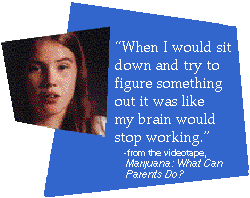Q: If a woman is pregnant and smokes marijuana, will it hurt the baby?
A: Doctors advise pregnant women not to use any drugs because they could harm the growing fetus. Although one animal study has linked marijuana use to loss of the fetus very early in pregnancy, two studies in humans found no association between marijuana use and early pregnancy loss. More research is necessary to fully understand the effects of marijuana use on pregnancy outcome.
Studies in children born to mothers who used marijuana have shown increased behavioral problems during infancy and preschool years. In school, these children are more likely to have problems with decisionmaking, memory, and the ability to remain attentive(2).
Researchers are not certain whether health problems that may be caused by early exposure to marijuana will remain as the child grows into adulthood. However, since some parts of the brain continue to develop throughout adolescence, it is also possible that certain kinds of problems may appear as the child matures.
 Q: What does marijuana do to the brain? Q: What does marijuana do to the brain?
A: Some studies show that when people have smoked large amounts
of marijuana for years, the drug takes its toll on mental functions
(4). Heavy or daily use of marijuana affects the parts of the brain that control memory, attention, and learning. A working short-term memory is needed to learn and perform tasks that call for more than one or two steps.
Smoking marijuana causes some changes in the brain that are like those caused by cocaine, heroin, and alcohol.
Scientists are still learning about the many ways that marijuana
can affect the brain.
Q: Can people become addicted to marijuana?
A: Yes. Long-term marijuana use leads to addiction in some people. That is, they cannot control their urges to seek out and use marijuana, even though it negatively affects their family relationships, school performance, and recreational activities (9). According to one study, marijuana use by teenagers who have prior antisocial problems can quickly lead to addiction (3). In addition, some frequent, heavy marijuana users develop “tolerance” to its effects. This means they need larger and larger amounts of marijuana to get the same desired effects as they used to get from smaller amounts.
Q: What if a person wants to quit using the drug?
A: In 2004, over 298,000 people entering drug treatment programs reported marijuana as their primary drug of abuse. However, up until a few years ago, it was hard to find treatment programs specifically for marijuana users.
Now researchers are testing different ways to help marijuana users abstain from drug use. There are currently no medications for treating marijuana addiction. Treatment programs focus on counseling and group support systems. There are also a number of programs designed especially to help teenagers who are abusers. Family doctors can be a good source for information and help when dealing with marijuana problems.
|